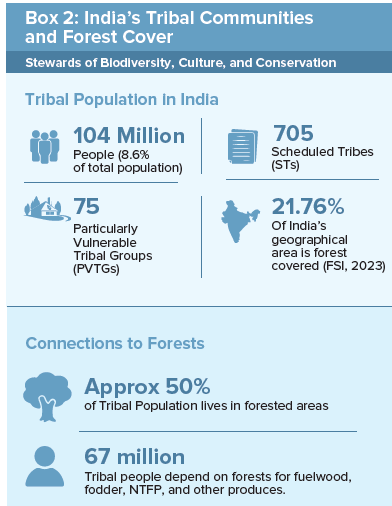PREVIOUS
Forest Rights in India
September 4 , 2025
15 hrs 0 min
25
0
- This 2025 report titled Securing Rights, Enabling Futures: Policy Lessons from Forest Rights Act and Future Pathways was released by UNDP India in partnership with the Foundation for Ecological Security.
- The Forest Rights Act (FRA), enacted in 2006, aims to recognise the rights of forest-dwelling tribal communities in India.
- The study focuses on three Indian states with significant tribal populations: Odisha, Chhattisgarh, and Maharashtra.
- Globally, community land rights are linked to improved forest governance, climate resilience, and carbon mitigation, as noted by the Intergovernmental Panel on Climate Change (IPCC) in 2019.
- By 31 May 2025, 25,11,375 titles have been distributed under FRA, covering 23.2 million acres of forest land.
- It was including 5.07 million acres under individual and 18.19 million acres under community rights.
- The Ministry of Tribal Affairs (MoTA) supports FRA implementation through training, monitoring, and budget allocations under the Dharti Aaba Janjatiya Gram Utkarsh Abhiyan (DA-JGUA).
- The United Nations Development Programme (UNDP) has partnered with MoTA and six state governments to support FRA implementation and convergence with development programmes.

Leave a Reply
Your Comment is awaiting moderation.


